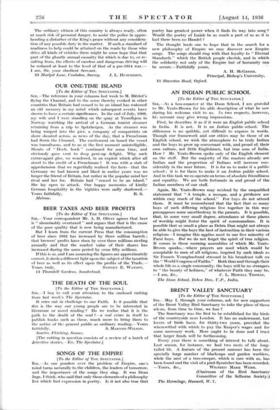OUR ONE-TIME ISLAND
[To the Editor of THE SPECTATOR.]
SIR,—The reference in your columns last week to M. Bleriot's flying the Channel, and to the sense thereby evoked in other countries that Britain had ceased to be an island has wakened an old memory in my mind which subsequent events have shown to have a certain significance. In the end of July, 1909, my wife and I were standing on the quay at Trondhjem in Norway watching- the arrival of a German tourist steamer returning from a trip to Spitzbergen. - As the steamer was being warped into the pier, a company of compatriots on shore shouted across, as news of the day, that a Frenchman had flown the Channel. The excitement on board the vessel was tumultuous, and to us at the first moment unintelligible. Shouts of " Hoch, hoch " continued for some time, and obviously gave vent to deep pent-up delight. Why such extravagant glee, we wondered, in an exploit which after all stood to the credit of a Frenchman ? It was with a stab of apprehension that we regretfully realised the facts—that the Germany we had known and liked in earlier -years was no longer the friend of Britain, but rather in the popular mind her rival and her foe. Britain had " ceased to be an island." She lay open to attack. Our happy memories of kindly German hospitality in the 'eighties were sadly shadowed.—






































 Previous page
Previous page